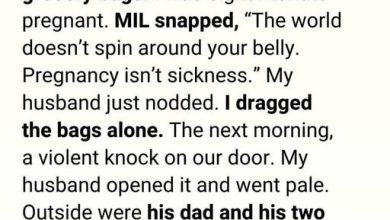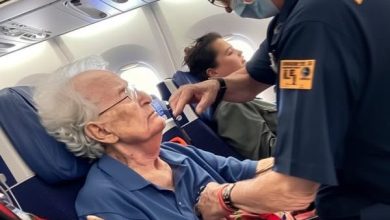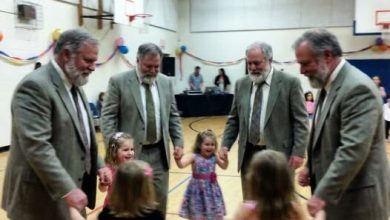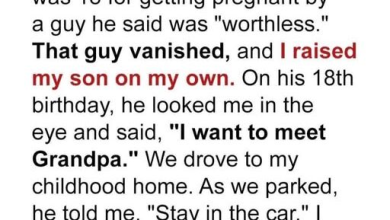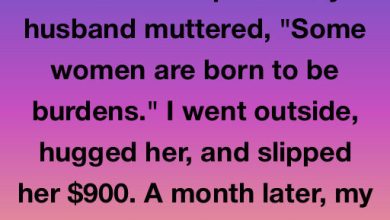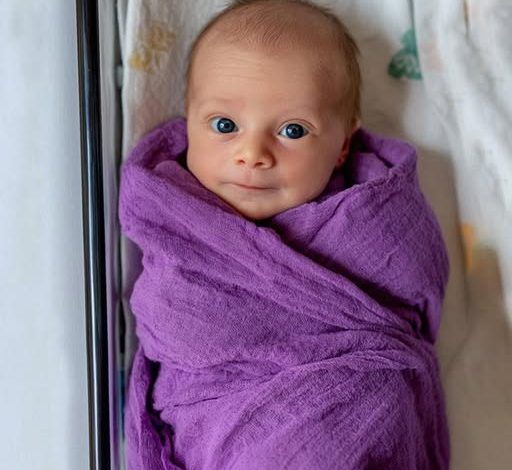
“After Our Baby Was Born, My Husband Saw Their Face—and Started Sneaking Out Every Night!”
I nearly died giving birth to my daughter, and I thought that would be the scariest part of becoming a mother. Eighteen hours of labor, alarms blaring, a doctor shouting, “We need to get this baby out now”—and then, nothing. A weightless black. I clawed my way back to the sound of my husband’s trembling voice: “Stay with me, Julia. I can’t do this without you.”
When I woke, Ryan looked exhausted—his face drawn, eyes red, as if he’d aged ten years overnight. “She’s here,” he whispered. “She’s perfect.” A nurse placed Lily in my arms: seven pounds, two ounces, impossibly whole. I asked if he wanted to hold her. He nodded, cradled her gently, and then something in his expression shifted—joy flickered into something darker. He handed her back too quickly. “She’s beautiful,” he said, but the warmth wasn’t there.
I blamed exhaustion. We’d both been through hell. But at home, it didn’t fade. He fed her, changed her, did everything right—but rarely looked at her. His gaze hovered just above her face, as if he were afraid to meet it. When I tried to take newborn photos, he found excuses to leave. By the second week, I started waking to the sound of the front door clicking shut. By the fifth night, it had become a pattern.
“Where were you?” I asked over coffee, keeping my tone light.
“Couldn’t sleep. Went for a drive.”
That night, I pretended to sleep. Around midnight, he slipped out of bed. I grabbed my keys and followed him from a distance. He drove past our old date-night ice cream spot, out past the city, and pulled into a worn-down community center with a flickering sign: HOPE RECOVERY CENTER. He sat in the car for a long minute, then hunched his shoulders and went inside.
I waited, then peeked through a half-open window. Folding chairs in a circle. Twelve people. My husband, head in his hands.
“The hardest part,” he said, voice breaking, “is when I look at my kid and all I can think about is how I almost lost everything. I see Julia bleeding, doctors rushing, and I’m holding this perfect baby while my wife is dying next to me. Every time I look at Lily, I’m right back there. I’m terrified if I love them fully, it will all be ripped away.”
An older woman leaned forward gently. “Fear of bonding after a traumatic birth is common. You’re not broken, Ryan. You’re healing.”
I slid down the wall outside and cried. All this time, while I worried he might regret becoming a father, he had been dragging himself to a room full of strangers, in the middle of the night, trying to figure out how to be one.
He talked about nightmares that tore him awake, replaying the delivery room in slow motion, avoiding skin-to-skin contact because he feared his anxiety would reach her. “I don’t want her to feel my fear,” he said. “I’ll keep my distance until I can be the father she deserves.”
“Have you thought about including Julia?” the group leader asked.
He shook his head. “She almost died. She doesn’t need to carry me, too.”
I drove home quickly, slid back into bed before he returned, and listened to Lily’s soft breathing. The next morning, while he was at work and she napped, I called the center. “My husband’s been attending your group,” I said. “Is there something for partners?” There was—a Wednesday night circle.
I went. Eight women sat in folding chairs, all wearing the same hollow, startled look I’d carried for weeks. We talked about birth trauma, how it fractures both parents differently, and how avoidance is the mind’s clumsy way of protecting what it loves. The leader said, “With support and communication, couples come out stronger.” For the first time in weeks, I felt hope stir.
That night, I stayed up. Lily slept against my chest. When Ryan came in, surprise flickered across his face—I rarely stayed awake anymore.
“We need to talk,” I said softly. “I followed you.”
He closed his eyes, shoulders sagging. “I didn’t want you to worry.”
“We’re a team,” I said, moving closer.
He looked at Lily, then at me. “I was so afraid of losing you both,” he whispered, touching her tiny hand.
“You don’t have to be afraid alone anymore.”
Two months later, we’re in couples counseling. He still goes to his group; I still go to mine. Every morning, he takes Lily first, presses his cheek to hers, breathes in that warm milk scent, and looks at her fully—love unshadowed. Nightmares come less often, and when they do, he wakes me, and we walk the hallway together under the soft glow of a nightlight.
We didn’t get a glossy first chapter. We got a hard one. But the pages after are softer. Sometimes the face you can’t bear to meet is the one that leads you back to the life you almost lost. Sometimes the darkest night is just the road between where you were—and where you’re brave enough to go now.
